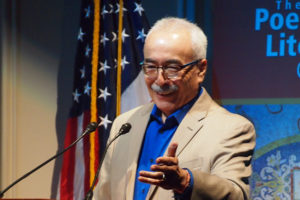As you may have seen, COG just announced its celeb judges for its Page to Screen and Poetry contests. Our close-knit campus community is abuzz with the news that U.S. Poet Laureate Juan Felipe Herrera and NPR/PRI host Glynn Washington will serve as the final judges. And COG’s staff has already begun receiving questions from our international readership.


So writers, rev up your laptops and add these deadlines to your calendars: January 31, 2017 (poetry) and March 31, 2017 (stories). The winners in each category will receive publication online and in print, a $1,000 prize and a blurb by the final judge. Better yet, each winning work will be adapted into an animated short film, 2D animation, graphic novel or series of interpretive illustrations by students in USV’s celebrated Digital Art & Animation and Digital Audio Technology programs.
While the judges do have the final say — and I can’t pretend to know the ultimate decision they’ll make — I’m in the midst of reading 800 poetry entries (screened down from thousands) as the final judge of another international literary contest. And COG’s editorial staff has engaged in multiple discussions of the qualities of winning work. After supporting the 2015-2016 Page to Screen and Poetry contests, we’ve discovered some common themes and qualities in winning literary submissions.
Here are three things to keep in mind when submitting to the COG contests.
- Read the contest guidelines closely. We’ve had to disqualify entries that the staff had fallen head over heels for upon learning they were previously published, or written by a USV student or faculty member.
- Read at least one issue of COG. We’re looking for work that’s not only sophisticated, but intensely engaging. We want writing that grabs the reader and doesn’t let go.
- Revise, revise, revise. In today’s fast-paced publishing world, editors lack the bandwidth to suggest substantial changes. We’ll make minor copy edits, but are unable to pass work along to the final judges unless you’ve already taken the piece as far as you possibly can.
Good luck, writers! We hope to have the opportunity to read your stellar work.


